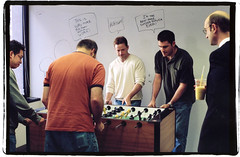Is friendship an enabler of Knowledge Management?
 |
| Foosball at work, by Al Abut, on Flickr |
We hardly ever use the word "F****d" about our work relationships. We call people colleagues, associates, co-workers, but never F****ds. It's as if F****d is a dirty word and inappropriate in work circles.
And yet, when we think about the relationships and the trust needed for knowledge sharing, and the social relationships we can build in Communities of Practice, is that so very far from Friendship?
I once interviewed a client from an Asian organisation as part of a Knowledge Management Assessment and Knowledge Management Strategy exercise, and he said to me "I often visit another manager that I know, to share my knowledge and help him achieve his targets. He is my friend, so I would help him".
And this quote, from an assessment of another company "If my friend's got a problem I can't leave him to work on it on his own". Here's another, from a third company. "It is a very small group of people in the division in (Country), and most of us are good friends since university. We share our knowledge very openly".
None of these quotes are from North American or European organisations.
I searched through many of my documents for the use of the word "friend", and in the North American and European organisations, the word was used as part of the phrase "user-friendly" and as part of the cliché "phone a friend" (a reference to the Millionaire TV show). With one notable exception (Canadian) I didn't find any reference to friendship at work.
In the North American/European mindset, friendship at work can be seen as a risk. See for example
- Danger: friends at work
- Work Friends vs. Real Friends
- 5 Common Pitfalls of Work Friendships
- Friendship and work: A good or bad partnership?
And yet, as the quotes above show, friendship is a huge enabler for effective knowledge sharing and knowledge re-use in otehr cultures. It removes the Not Invented Here barrier, and replaces it by "Invented by my friend". And an increasing number of studies suggest that work friends are good for your wellbeing and important for productivity.
So maybe we should stop looking at the risk and the downside of Friendship at work, and seek instead to help employees to build a wider social network of friends, as support for the behaviours and culture that Knowledge Management requires.
In fact, if we return to the person I first quoted, who said "He is my friend, so I would help him" - we asked this guy what would be the most useful thing the company could do, to encourage knowledge-sharing and re-use in the organisation. He replied;




No comments:
Post a Comment